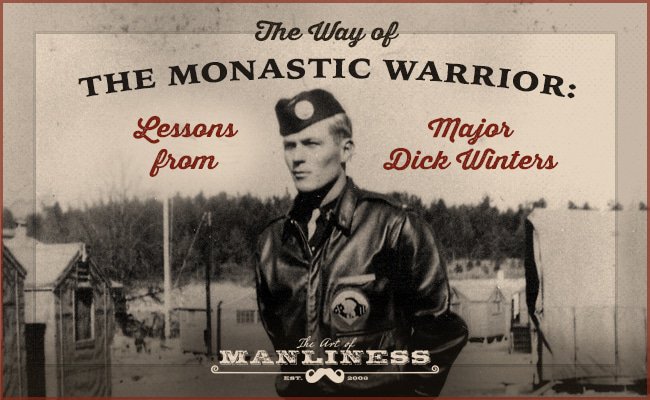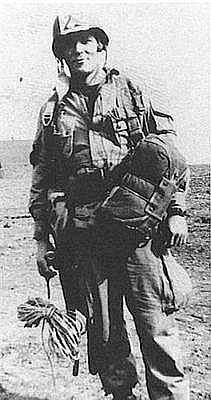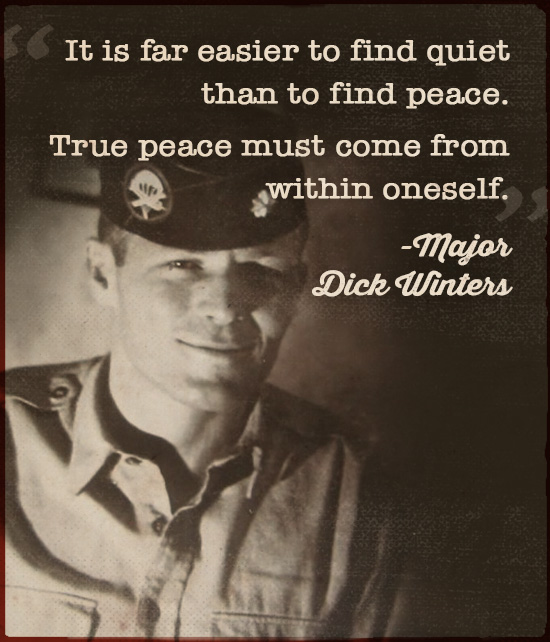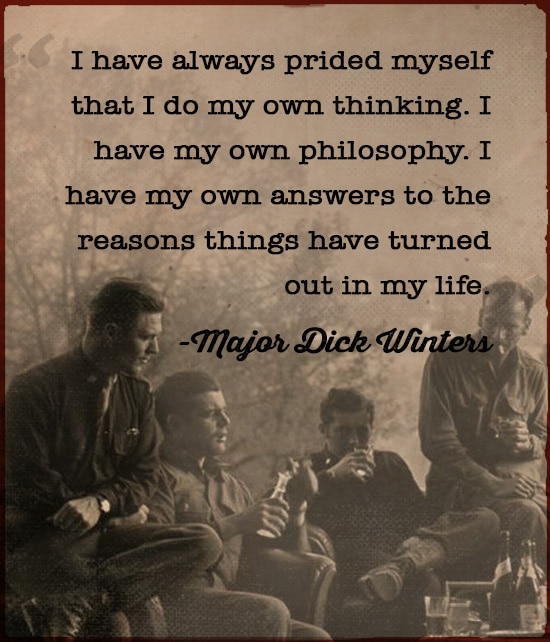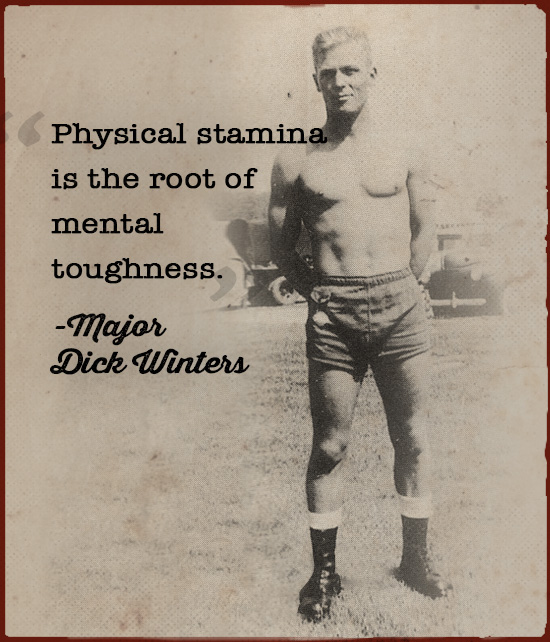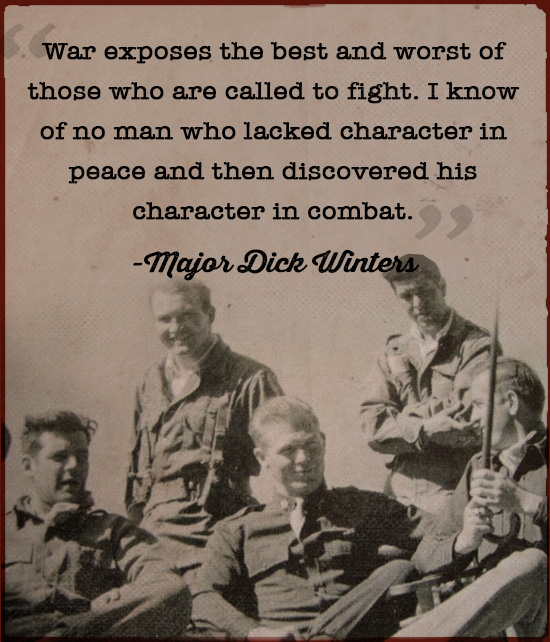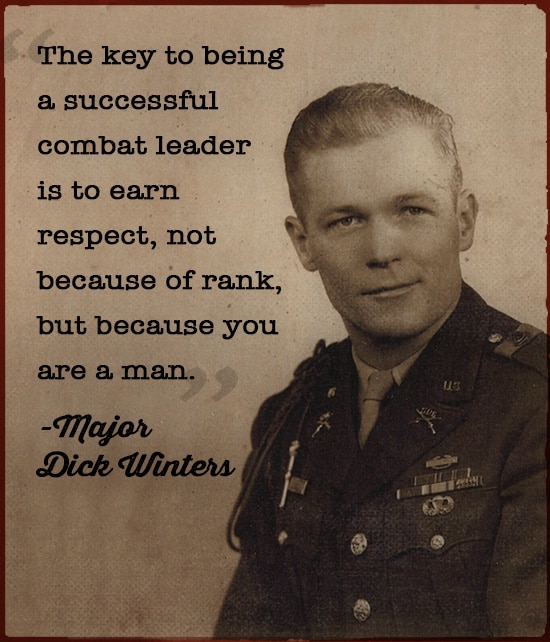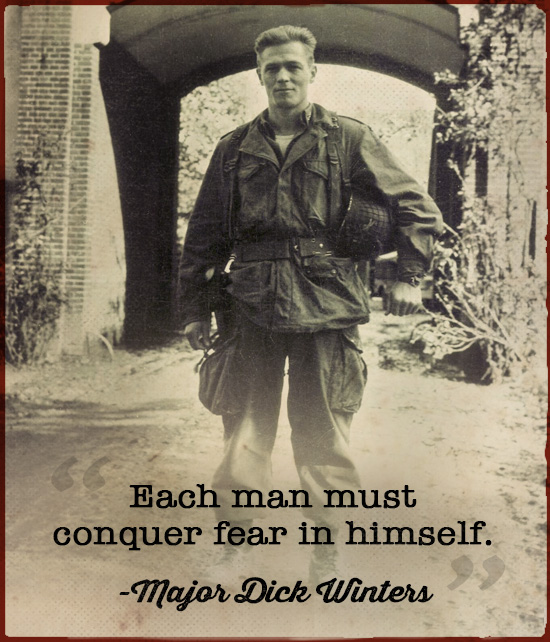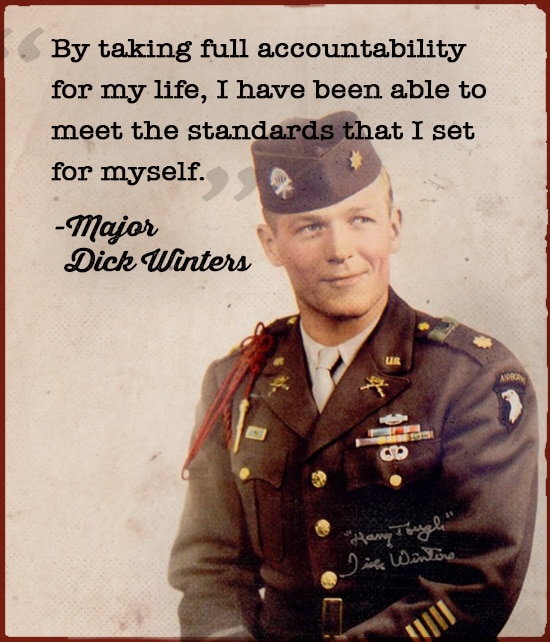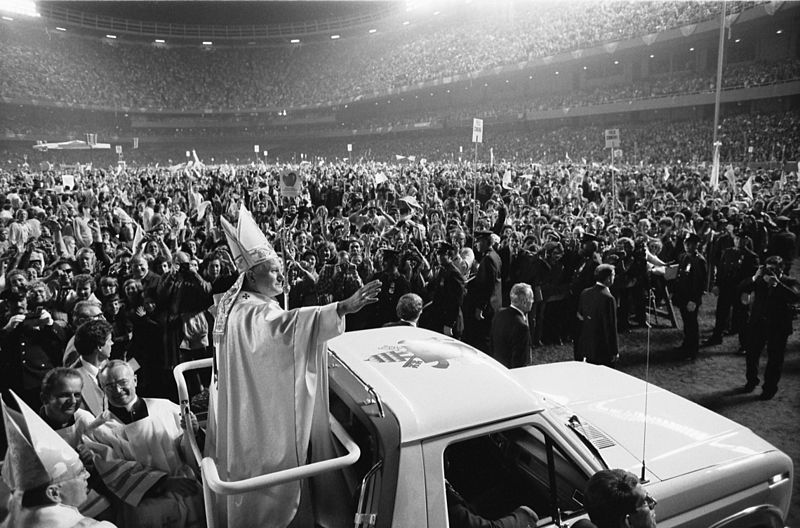Throughout history only a small percentage of men have been capable of making such a commitment, and today, communities of martial monks have all but disappeared. Yet introspective and iron-willed men have followed the way of the monastic warrior in every age — finding outlets to seek solitude amidst even the noisiest throng.
Perhaps the best example of this determination in more modern times can’t be found in some exotic temple or tucked-away monastery, but in a rather less likely place: The skies above Normandy, June 6, 1944.
Major Dick Winters, commander of Easy Company (aka the Band of Brothers), was cut from a different cloth than many military officers then or now. Sober and disciplined, quiet and reflective, cool and resolute, in many ways he lived a life apart from his men. Yet the strength and wisdom he gained from his “retreats” from the world enabled him to lead his troops through a D-Day attack on German artillery, an assault of the French town of Carentan, a bayonet charge on a dike in Holland, the cold of Bastogne, and finally to Hitler’s Eagle’s Nest in the Bavarian Alps. And he did it all as a 20-something, just recently removed from college graduation.
In his memoirs, Winters writes that it is his “earnest hope” that his remembrances and reflections will help each reader “find your personal peace and solitude in a turbulent world.” In a time of ceaseless noise and distraction, Major Winters’ message and example have truly never been more needed.
Even for those who adopt a less ascetic form of this path, it is in truth most conducive and productive for the youthful bachelor, who is yet unattached to family and settled responsibilities. Yet every man of every age and station in life can, and must, find ways to follow the way of the monastic warrior — to leave behind the madding crowd, develop himself completely, and fight and lead in whatever kinds of battles he finds himself.
Today, Major Dick Winters will be our guide to learning this hidden and elite art.
Withdraw from Worldly Distractions to Seek Solitude and Study
Growing up, Dick Winters was by temperament and intention a self-described loner. In high school and college, he was content to focus less on his social life and more on his personal development. Sports, work, and especially his studies took priority over “running around.” Simplifying his life in this way allowed him “time to spend with my inner thoughts and ideas stimulated by reading.”
Winters took a similar approach to serving in the Army, eschewing social pursuits in favor of studying military manuals and critically thinking through life and leadership. While training stateside, he “preferred a quiet evening in the barracks to the nightlife” of cities close to camp, and he abstained from joining “in the parties and social gatherings in which most officers participated.”
After their paratrooper training was complete, Easy Company deployed to the quaint English village of Aldbourne for nine months of preparation preceding the invasion of Normandy. On his first Sunday there, Winters attended a church service and then visited a small adjoining cemetery, where he “sat on a bench and took time for personal reflection and simply to enjoy some solitude.” It was there he met Mr. and Mrs. Barnes, who proved crucial in extending such opportunities for private contemplation.
The Barneses, who had already lost a son in the war, took an immediate liking to Dick, and when the Army asked who among the natives of Aldbourne might be willing to billet pairs of its officers, they volunteered their home — as long as Winters was one of the two.
The Barneses adopted Dick as one of their own, and provided him with a quiet refuge in which to hone his martial monasticism. While other officers and troops hung out at the village pub, and enjoyed the social life in neighboring towns, Winters rarely left Aldbourne, choosing instead to pore over tactical manuals and plan for D-Day. In preparing to lead men in combat, he felt his time to be extremely precious and thus devoted as much of it as possible to becoming “totally proficient in tactics and technology” and developing his own “personal perspective on command.”
The cozy, calm routine of the Barnes’ household proved wonderfully conducive to this aim, and allowed Major Winters to come into his own as both an officer and a man:
“A typical evening began with Mrs. Barnes knocking on my door before 9:00 P.M. and saying, ‘Lieutenant Winters, would you like to come down and listen to the news and have a spot of tea?’ Sitting around a smoldering chunk of peat in the fireplace, we listened to the BBC. Afterward, everybody would gather around the table and Mr. Barnes would read a passage from the Bible, then he would say a prayer, after which Mrs. Barnes would serve tea and biscuits or some fresh bread. Around 10:00 P.M., Mr. Barnes would then announce that it was time for bed.
My association with the Barnes family was one of the most enjoyable experiences in my life. They prepared me mentally for the tasks that lay ahead. I had observed their personal suffering at the loss of their son and experienced similar feelings when I lost some of my men in Normandy and the subsequent campaigns. By giving me time to reflect and to study my manuals for the nine months prior to the invasion, the Barneses helped me develop my own personality and hone my leadership skills.”
Major Winters ultimately found that his “intense study paid huge dividends in Normandy.” Not only did he have ready solutions to the challenges he and his men faced in combat, but his hours of quiet reflection proved invaluable in another way.
As the famous saying goes, “No plan survives first contact with the enemy,” and Major Winters encountered many scenarios to which there was no textbook answer as to how to proceed. In such situations he proved able to deftly improvise. The months of stillness to which Winters had exposed his mind left it keenly responsive to insights and intuitions — giving him what he termed a true “sixth sense” when it came to making decisions.
Women Can Wait
Most monks take a lifetime vow of chastity; Dick Winters didn’t extend it that far, but he did put the pursuit of women on hold for a season.
To Winters, romantic relationships were another distracting entanglement that would prevent him from fully developing himself and following the way of the monastic warrior. As is true of many eminent men, in his youth he made going after girls a low priority, and went on “only a handful of dates.”
When Winters went off to war, he and a female acquaintance became pen pals. She developed romantic feelings for the strapping officer, but he steadfastly kept her at arm’s length. In observing the men of Easy Company, he had found that those with romantic attachments were more susceptible to combat fatigue and shell shock:
“under fire in combat, whether it’s rifle fire or artillery, the men who seemed to have their eyes glazed over quickest and put their heads down and kept their heads down, were those who were married. Either they were married or in love or had a fiancée back home. They were the first to show fear. Those who hadn’t fallen in love or who weren’t engaged seemed to be able to hold on longer.”
Bachelors have less to lose and are therefore able to more fearlessly throw themselves into the fight. Thus, desiring to detach himself from anything that would inhibit his focus on the task at hand, Winters was committed to remaining in full-on monk mode for the duration, telling his pen pal:
“As a matter of fact, I wouldn’t even kiss a girl’s hand, for as a soldier, I don’t want any more people than necessary to even know me. It’s no good. If a soldier lives, O.K., get out of the army and forget it. If he doesn’t, O.K., there are just that fewer people who feel the toll of the war.”
In another letter, Dick told her that when it came to love, “I honestly don’t know what it is, and what’s more, I don’t really give a damn until the war is over.”
Discipline Body, Mind, and Spirit Through Physical Exercise
If you asked Major Winters about the root of his discipline, how he was able to stay so calm and resolute, and why he didn’t crack after landing in France miles from his target landing zone and without his weapons, spending 70 days on the front line in Holland, and weathering a month of constant cold and artillery barrages at the Battle of the Bulge, he’d point to one key factor: his physical fitness.
The word asceticism comes from the Greek askesis — which meant “exercise” or “training.” For the Greeks this training happened at the gymnasium, which might be, as it was for Aristotle, situated inside a school. The ancients believed a sound body and a sound mind went hand-in-hand.
Major Winters adopted this philosophy in his youth and participated in football, basketball, and wrestling. But it was at Georgia’s Camp Toccoa that his body would reach its full potential.
It was there that the US Army’s paratroopers were tested and trained en route to becoming an elite fighting force. Winters had joined the Airborne precisely for this challenge:
“Airborne troopers looked like I had always pictured a group of soldiers: hard, lean, bronzed, and tough…So I took it in my head that I’d like to work with a bunch of men of that caliber. The paratroopers were the best soldiers at the infantry school and I wanted to be with the best, not with the sad sacks that I had frequently seen on post.”
The physical training required of paratroopers was a big part of what attracted Winters to the unit, and he got plenty of what he desired. “To say training at Toccoa was intense,” he remembered, “is an understatement.” For 13 weeks Easy Company ran 5 miles before breakfast, double-timed it everywhere else, performed rigorous calisthenics, completed daily obstacle courses, undertook 25-mile hikes, practiced all-night field exercises, and of course, famously tackled 1,740 ft. Currahee Mountain. Several times a week, the men ran the grueling 3 miles up, 3 miles down.
Day and night, through dust, storm, and most cruelly, the blazing sun of a hot Georgian summer, potential paratroopers were physically tested to the point of exhaustion. The training was purposely designed to weed out the weak and less committed, and it had the desired effect; of the original 400 members of Easy Company, only 148 made it through.
Winters had no trouble however, enjoying the challenge and rising to the top of the pack; when a “Junior Olympics” was held — consisting of “the best time up and down Currahee, most push-ups, most chin-ups, and the best time through the obstacle course” — Winters won the competition and earned the right to serve as jumpmaster of the first contingent of officers.
Where Winters further separated himself from his peers was in the fact that his dedication to physical fitness neither ended on the last day of Airborne school, nor was limited to the minimum required of troops in the field.
Not only did he not allow his hard-earned fitness to slide after leaving Toccoa, he pushed himself even harder after arriving in England. Though intense day and night training continued for the men as they prepared for D-Day, Winters did his own workouts during his personal time:
“whenever possible, I took opportunity to improve my physical stamina…Not surprisingly, I felt that I was in the best physical shape in my life as Easy Company prepared for the invasion at Aldbourne. This did not happen by accident. Following a rigorous day of training, I would take a run every evening following tea with the Barneses. As they were on their way to bed, I would say, ‘Well, I’m going to take a walk.’ I would go out and run for several miles even though blackout conditions were in effect. Then I’d come home and go to bed.”
Winters kept up the exercise habit after Easy Company deployed for combat missions, finding it invaluable in mitigating the stress that accumulated from having to regularly make life and death decisions. He committed himself to a rigorous routine, in which “there were only a few days that I didn’t run two to three miles, do eighty push-ups, sixty sit-ups on a foot locker, a couple of splits, and some leg and trunk exercises after the day’s work was over.”
Winters felt that it was this training that ultimately allowed him to remain mentally alert, control his fear, and avoid breaking down under stress:
“Because I was in such good shape, my fatigue level never reached the point of physical exhaustion that contributes to mental exhaustion and, ultimately, to combat fatigue. We all experienced sleep deprivation at times—that is the nature of stress—but a physically exhausted leader routinely makes poor decisions in times of crisis.”
For this reason, Major Winters strongly believed that “Moral courage is based on physical fitness.”
Develop the Highest Moral Character and Lead By Example
Monastic warriors were called not only to cultivate sharp minds and fighters’ bodies, but to develop themselves into men of the highest moral caliber. In this standard too, Dick Winters strove to reach the pinnacle of his potential.
Winters believed that the cornerstone of character was honesty, and that from there you worked to develop a moral compass that was guided by the virtues of courage, fairness, consistency, selflessness, and respect for your fellow men. He felt that integrity was paramount as well, noting that “it is easier to do the right thing when everyone is looking,” but “more difficult to do what you should do when you are alone.”
To these core values, Winters added his own ascetic precepts, choosing to abstain from canoodling with women, drinking alcohol (he was a lifelong teetotaler), and, as we shall see, swearing.
For Winters, keeping his personal honor code was a matter of integrity and self-respect; he wished to be able to look in the mirror and hold his head high. He also believed that moral excellence kept the mind pure and sharp, and enabled a man “to make decisions quickly and correctly.”
But Majors Winters’ pursuit of character was not undertaken for himself alone, but rather formed an essential part of his ability to lead.
The word monastic derives from the Greek monos, meaning “alone.” But while we tend to think of monks as living completely solitary lives, it’s more accurate to describe them as embracing solitude in community. They were called to strengthen their brothers, and to serve as an example of spiritual power to the laity-at-large.
Winters took this calling seriously. As his biographer and friend Colonel Cole C. Kingseed wrote, Major Winters ultimately “viewed himself as a leader 100 percent of the time” and never stopped striving to be an example both to his troops and to the larger community. When his pen pal asked him if it was true that soldiers routinely “raised hell” while on leave, Winters responded in no uncertain terms that no matter what others did, his own morals were never “off-duty”:
“It doesn’t mean that everybody raises hell. Take it or leave it. I didn’t, never have, never will, raise hell while I am in the U.S. Army. Why? First and most important, I’ve got my own conscience to answer to. Next, my parents, and then I am an officer in the U.S. Army. I am damn proud of it and with the rank and position I hold. I wouldn’t think of doing anything to bring discredit to my outfit, my paratrooper boots, wings, the airborne patch, or the U.S. Army. Good morale within an outfit is usually reflected by good conduct away from it. That sounds like an idealistic high school kid, I know, but that’s it. That’s how I feel.”
Winters believed that this kind of dedication to maintaining integrity made him a better commander and earned the loyalty of the men who served under him. One of his favorite maxims was “Lead from the front!” and he felt it his duty to command his men from a position that was beyond reproach; he never wanted his behavior to serve as grounds for charges of hypocrisy or act as a distraction:
“If you have character, that means the guy you are dealing with can trust you. When you get into combat, and you get in a situation such as we were in along the dike in Holland, when I gave the orders, ‘Ready, aim, fire,’ nobody else was thinking about anything except what he had been told to do. The men trust in you, have faith in you, and they obey, no questions asked. That’s character in a nutshell.”
Winters believed that another essential part of leading from the front was demonstrating a willingness to jump into the heat of the fight and face danger alongside his men. During battle, Winters felt fear himself, but he conquered it and showed his soldiers he had the “intestinal fortitude to organize the chaos around them.” As the major recounts, one of the most powerful effects of a man’s example of courage is its ability to unlock the bravery of his brothers:
“The intensity of a fire, or a heavy concentration, to be a leader, you have to be able to concentrate on that fire and move just as soon as it stops or the last round hits. Move. Get up. Start circulating among your men. Is everybody okay? Let’s get up. Let’s move. Keep your eye open for an attack. Get their attention. Move among your men as quickly as possible. And moving among them—the fact that they see you and they’re talking to you—they know that you are there and you are talking to them, and it makes all the difference in the world to know that you are not in this thing by yourself. That’s what officers must do—break the cycle of fear. If a soldier is concentrating on his own feelings and on his own fear, and he sees you moving around, he realizes that you’re sharing the burden with him. That’s why he can then move.”
Find Ways to Feed and Center Your Spirit
At the center of monastic life are rituals and routines that are used to maintain a disciplined mind and feed the soul.
For Major Winters, his spirit-maintaining ritual was church attendance. Very few soldiers attended religious services while overseas, even in the anxious days leading up to the invasion of Normandy. But for Winters, going to church “became the bedrock of [his] character” and he only missed 3 services in the 9 months he lived in Aldbourne. As he explained to his pen pal, “The way I feel about it, it is a very special privilege to be able to go at all and I don’t want to miss a chance.”
At the small church he attended, Mrs. Barnes played the organ and Mr. Barnes served as a lay preacher and gave the Sunday sermon. Winters would shine his boots, polish his buttons, and don his best dress uniform, and then come and sit in the front row of the congregation. It was a routine that calmed and centered him in the midst of the tension and commotion preceding D-Day.
It was naturally much harder to attend church once Easy Company got into the field, but Winters always looked for opportunities to go — even when the service was held “in a barn with some cows and horses crunching some hay and adding a delightful aroma to the setting.”
However, his most powerful spiritual experience during the war happened outside any walls at all, when he found “church” while hiking the Alps at the close of his mission in Europe:
“The aisle is two mountain ranges down which you can see for ten miles at least. At the end there’s just a series of mountain peaks. A storm came up and the dark clouds covered everything but the far end, where the sun shone through on those magnificent peals [sic]. The color was all shades of rose, a light, soft rose, nothing hard or bright, but just rays of light coming through the clouds. There were the most beautiful stained glass windows I’ve ever seen, or hope to see. What a wonderful place to pray. What a magnificent church. I’ll never forget it.”
Take a Vow of “Silence”
Many monks take some kind of vow of silence upon entering a religious order. This usually doesn’t require not speaking at all, but rather speaking only at certain times, and even then avoiding trivial conversation and useless and unnecessary words. Since thoughts influence words, and words in turn influence thoughts, ascetics believe that garrulous speech inhibits the development of self-knowledge, access to deity, and the ability to live more harmoniously with one’s spiritual path.
Here again, Winters proved monkish in temperament — a generally reserved and quiet man, he wasn’t one for idle chit-chat. When he spoke; you knew he had something important to say.
He also stripped his speech of all profanity — believing such words were needless and unbecoming of an officer and a gentleman. Vulgarities disrupted the stillness of mind he worked so hard to cultivate; he understood the secret encapsulated by the Benedictine monk Andrew Marr: “Silence is not a mere absence of words or thoughts — it is a positive and substantive reality.”
As Winters’ friend Bob Hoffman relates in Conversations With Dick Winters, the major felt so strongly about profanity, he almost derailed HBO’s biopic over the issue:
“When Dick initially viewed the transcript of the miniseries Band of Brothers, he was offended that Damian Lewis, who portrayed him on film, used excessive profanity throughout the series. Dick immediately wrote a letter to Tom Hanks, resigning from the project because ‘I don’t want these boys and girls thinking it is acceptable using profanity. You know that is not who I am.’ Hanks issued a tepid apology, but he claimed it was too late in the production cycle to edit the offensive language. Dick held firm and steadfastly countered each of Hanks’s points of rebuttal. Winters won again and you won’t hear a single word of profanity from Lewis.”
Live From Day to Day and Simply Do Your Best
Easy Company’s missions from D-Day to Bastogne were filled with danger and death, and to keep himself moving through it all, Major Winters had to adopt a zen-like attitude towards his position.
When the stress became too much, he committed himself to living the war “one day at a time” and keeping his focus on the very basics:
“If combat had taught me anything, it taught me what was essential in life and what wasn’t. In my prayers before D-Day, I had always thanked God for what He had done for the world in general and asked that others would be given a break in the future. I had also thanked Him for a lot of things that I now found to be insignificant. The only thing I asked for now was to be alive tomorrow morning and to survive another day. That was all that mattered–that was the only thing as far as wanting anything for myself. All other things had become extra, nonessential, and I could not be bothered or burdened with nonessentials.”
Rather than worrying about whether he was doing too much, or too little, and dwelling on past regrets, Winters also established a simple and straightforward standard for judging his own actions and whether or not he had succeeded as a leader and a man:
“True satisfaction comes from getting the job done…Ribbons, medals, and accolades, then, are poor substitutes to the ability to look yourself in the mirror every night and know that you did your best.”
As Colonel Kingseed relates, when Erik Jendresen, lead writer and a supervising producer for the Band of Brothers miniseries, began to work on the film’s screenplay with Winters, he “came to understand what it was about this man that helped him win the war”:
“He learned that Winters had had a simple yet profound insight at age twenty-four: that the most efficient and commonsense way to get through all that war was—from brutal training to Mickey Mouse bureaucratic nonsense, and through harm’s way and all that one could not train for—was to pursue excellence in everything he did. ‘Dick Winters made it his personal quest to excel,’ said Jendresen, ‘whether it was in executing the perfect pushup or training himself to run the three miles up and down Currahee Mountain, this pursuit was his private tool, his solution. And it was that solo effort—that obsessive clarity and pure, determined, self-contained purpose—that his men observed and that caused them to follow when he said, simply, ‘Follow me.’ Not just through that hedgerow in Normandy and across that field in Holland under enemy fire, but follow my example, follow my commitment. And we’ll get through this and we will succeed.”




